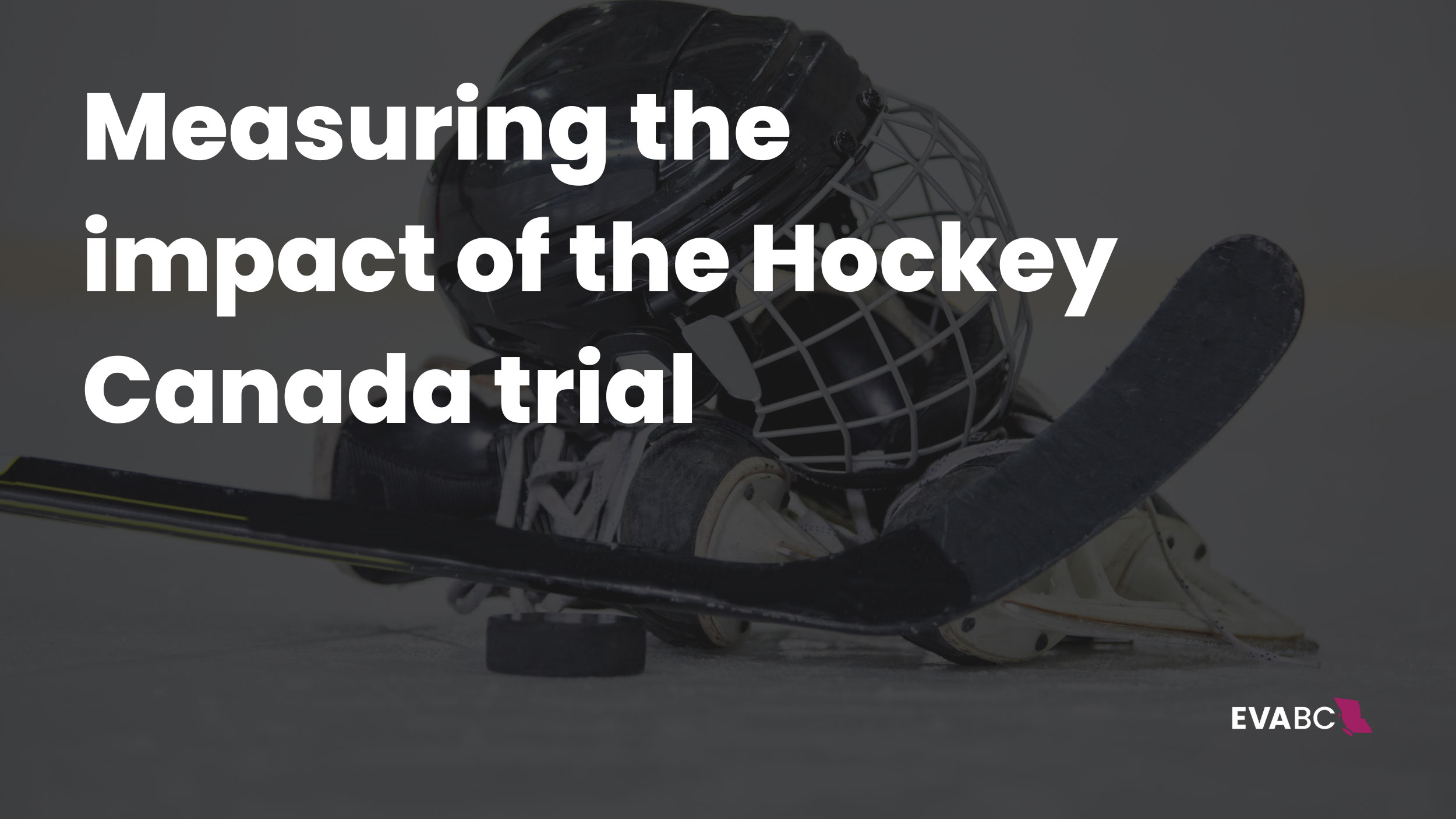FOR IMMEDIATE RELEASE — August 13, 2025, Vancouver, BC
Flaws in the court system, bias against survivors, and the best way to move forward: measuring the impact of the Hockey Canada trial.
The eight-week long case against five men charged with sexual assault and the Justice’s decision that found the victim/survivor’s case to be neither “reliable nor credible,” minimizes and ignores the impact of the trauma of being sexually assaulted and how traumatic events can affect victims/survivors’ ability to remember.
As a provincial association representing 300 frontline anti-violence programs, EVA BC has a responsibility to speak up and advocate for the workers and the survivors we support. This court decision has left many who work with survivors of sexual violence in communities across BC and Canada disheartened and angry at the treatment towards the survivor and by the sense of accused perpetrators not being held to account.
With a growing need for funding for initiatives for culture change and prevention, advocates and anti-violence workers are also feeling the pushback on the work they do to support survivors, and our sector is fearful of the effect this will have in further silencing the voices of survivors.
The high-profile case, with daily media updates of hours-long cross-examination of the “complainant,” the survivor known as EM, by five separate defence lawyers, has once again exposed details of how victims/survivors who report sexual assault and seek justice and accountability are treated by the justice system. The case echoes research that has shown the disturbing pattern of how survivors — particularly women — are scrutinized, shamed, or disbelieved, while perpetrators — usually men — benefit from these outdated myths and biased assumptions that work in their favour.
Dr. Kim Stanton’s recent independent review of BC’s legal system: The British Columbia Legal System’s Treatment of Intimate Partner Violence and Sexual Violence, outlines what she heard from survivors and those who work to support them. She points to “… report after report [that] has identified the barriers to survivors in accessing justice and made recommendations …” but “… without a marked improvement in access to justice for survivors.” She says “… a reimagining of what justice can look like is called for by those inside and outside the legal system: small changes are not sufficient to solve complex problems.”
Alongside various other recommendations to improve community collaboration, accountability and follow-through, and better supports and access for survivors, Dr. Stanton’s recommendations also focus on a preventive approach including recommendations to:
- Prioritize support for prevention initiatives,
- Prioritize support services for survivors and services for men who use violence,
- Strengthen the system-wide framework of education and training of actors across the system (including Crown Counsel, courts and corrections) on the “… dynamics of gender-based violence, unconscious bias, and the elements of effective trauma-informed practice.”
What message is the outcome of this case sending to men and boys?
Witnessing the survivor in this case be publicly shamed through the trial and listening to the harsh verdict delivers the message that anyone who experiences sexual assault should stay silent. Witnessing the lack of accountability for perpetrators, men and boys get the message that perpetrators will be allowed to continue to commit sexual assault with little to no consequences. Culture can only change if we acknowledge there is a problem.
EVA BC’s Be More Than a Bystander program, in partnership with the BC Lions Football Club, since 2011 has worked to shift culture and behaviour to prevent gender-based violence with a youth-facing high school program and an expanding workplace training program that challenges difficult behaviours and encourages positive leadership and safer workplaces in male-dominated industries. We agree with Dr. Stanton’s assessment that preventive work is an essential piece of what is needed to increase safety, understanding and justice for survivors of gender-based violence including sexual assault.
We need to have more public conversations centred around coercion, power and consent. The legal system rarely delivers justice for victims/survivors of sexual assault — but through conversations and education we can begin to shift our culture. This lack of understanding about consent and the reliance on outdated myths and assumptions about sexual assault isn’t just happening in sports. Instead, cases like this show how it influences even the highest courts in our country. In the end, a case like this holds a mirror to broader systemic failures.
EVA BC stands with survivors – always.
Ending Violence Association of BC (EVA BC)
The Ending Violence Association of BC (EVA BC) is a member organization that supports, trains and advocates for anti-violence workers in close to 300 anti-violence programs across the province that respond to sexual and intimate partner violence, child abuse, and criminal harassment. We work with cross-sectoral partners and other stakeholders to enhance community capacity and prevent gender-based violence, harassment and hate.
If you or anyone you know is a survivor of sexual assault and needs support, there are Sexual Assault Services programs in communities across BC that can help you.
For media enquiries
To arrange media interviews with EVA BC’s Executive Director, Ninu Kang, please contact: Fiona Jackson Communications Manager | fjackson@endingviolence.org 604-379-5364 |


